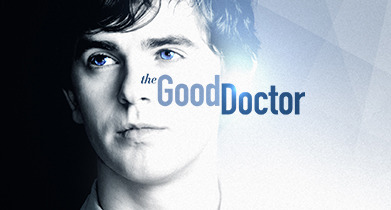The Good Doctor is basically an inverted version of House

As it turns out, executive producer David Shore knows how to make exactly one kind of show. Sure, there’s the odd Sneaky Pete or miniseries like Houdini And Doyle, but really, he’s got one true skill: Stories about brilliant but socially isolated doctors and the people who orbit them. First, it was House; now, it’s The Good Doctor, network TV’s latest attempt to recapture the magic of the Hugh Laurie-starring procedural, by reworking a popular Korean drama that follows a doctor with autism. But this time, they’ve inverted the formula, hoping that a warm and endearing (but still difficult to work with, of course) protagonist will succeed where so many prickly and off-putting carbon copies of Gregory House have failed. And rather than letting others take a stab at it, they’ve brought in David Shore himself; if the guy who cracked the code the first time doesn’t know how to reboot it, who does?
The Good Doctor spends most of its first episode trying to juggle too many elements, but there’s one issue that towers above the rest. Clearly, having a lead character with autism was a potential minefield for the series. Approach it from the wrong perspective or deliver an unfair depiction of the disorder, and you risk pissing off the very group you’re trying to represent. Offer too neutered and cuddly a vision, and it looks like you’re being patronizing. And the premiere does deliver something a little too close to a “just so” story—a tale of a bright young man who just needs a chance to prove himself, darn it, and help those around him overcome their prejudices. Accompanied by swooning musical cues and one too many shots of star Freddie Highmore in genial soft focus, it sands off so many potentially rough edges that it risks turning his character into more of a really smart teddy bear than a person dealing with autism.
But within the parameters of a very standard-issue medical drama, Shore has laid the foundation for a reliably engaging procedural—mostly through smart casting. Highmore, who blossomed into a terrific actor over the course of Bates Motel, here makes his character deeply sympathetic, even as he retains a sharp level of opacity, keeping the audience at emotional arm’s length, unsure if the next brusque real-life encounter will set off tears, frustration, or nothing at all in the enigmatic young man. He digs into the nuances of Dr. Shaun Murphy, a new resident at San Jose St. Bonaventure Hospital, who also just so happens to have a (high-functioning iteration of) autism spectrum disorder. Luckily, he also has savant syndrome, meaning he has perfect memory, tremendous intuition, and can see things everyone else will miss, making him an excellent doctor.
In case any of this was unclear, the show literally spells it out, with the pilot alternating between Shaun saving a boy’s life after an accident at the airport and the hospital’s president, Dr. Aaron Glassman (Richard Schiff), pleading the case for his new hire to a reluctant board of directors. If you want to engage in cheap emotional button-pushing without making it feel treacly, Schiff’s your man: He conveys the hokum with a minimum of cheese, leaning into the more gruff aspects of the character despite being saddled to a backstory in which Aaron views Shaun as basically a surrogate son. (Again, no wiggle room here: “He’s like a son to you,” says a combative board member whose name may as well be Dr. Relationship Establisher.) With Highmore and Schiff, the show has lucked into two leads who will sell the good and bad alike and make it all pretty watchable.
Shaun’s brilliance is depicted in the typical way of the post-Sherlock television landscape. Like all TV savants, we see the images conjured whenever he dives into his memory palace, searching for the right piece of information that will help him solve whatever conundrum he’s currently facing. Similarly, he gets a series of flashbacks that establish his rocky childhood (complete with a brotherhood-above-all bond with his sibling) and set the tone for his history with Aaron. These also suffer from a lack of show-don’t-tell, making sure we don’t miss a moment of the touchstones that have shaped Shaun’s life.
Unfortunately, with all the focus on Shaun and Aaron, the rest of the supporting players come across like an afterthought. Much like on House, Shore struggles to find interesting things to do with the other residents of the hospital. Two of them are having a secretive sexual relationship, of course, and another is little more than “the mean one” at this point. It’s utterly predictable, but the chief surgeon (Nicholas Gonzalez) whose team Shaun joins is an arrogant ass who doesn’t trust his newly installed resident, and the fractious interplay between them that closes the episode will make for an effectively combative dynamic. There are other hints of intrigue—a scheming board member (Hill Harper) angling for Aaron’s job, the nepotism hire who turns out to be a sharp ally (Beau Garrett)—but it’s mostly a paint-by-numbers affair, and still too early to tell whether it can be enriched and pay dividends down the road. Again, it’s all so House-lite that it’s tough to say how long it’ll take to find its own identity.
Ultimately, this series will live or die by the degree to which it finds a winning formula for inserting Highmore’s Shaun into the day-to-day of the standard medical procedural dramatics. Shore has established the boilerplate world, and thanks to his leads, it has potential to evolve. But this first episode leans hard into the sudsy pontificating; hopefully, it’s just opening-night jitters for a show featuring a person with a condition rarely showcased on TV outside of A Very Special Episode. Like its central character, The Good Doctor is going to have to get a little more willing to take risks.